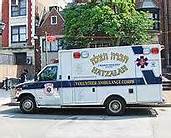The Ambulance That Wasn’t Needed
by Rabbi Mordechai Rhine
The fundraising efforts for the Mishkan were going quite well. In general it would be gauged as a massive success. Yet there was one group of people  that did not donate right away and were censured for their delay. This group was none other than the princes of each tribe. The same people who were so dedicated in Egypt in times of crisis were now the last to give. These were great, wonderful people. How could it be that they almost lost the chance to participate in this mitzvah?
that did not donate right away and were censured for their delay. This group was none other than the princes of each tribe. The same people who were so dedicated in Egypt in times of crisis were now the last to give. These were great, wonderful people. How could it be that they almost lost the chance to participate in this mitzvah?
The commentaries tell us that the reason that the princes were delayed was because of a calculation. They said, “Let everyone else give their donations. Then whatever is missing we will fill in.” What actually happened is that the people were so generous that there was very little left to give. The princes ended up able to give certain precious stones which had not yet been given. But because of their delay they were almost left out and were censured for their calculation. What indeed was wrong with their calculation?
Rav Hirsch explains that the princes were people who thrived in situations of crisis. In the words of one contemporary leader, “They were like tea bags. You only saw their strength when the people were stuck in hot water.” The princes thrived in times of crisis. In such times they reached out, they helped; they showed they cared.
But the Mishkan was not built on a foundation of crisis. Like the Bais Hamikdash later, the Mishkan was built on a foundation of peace, stability, and love. The princes reaction was not in sync with what the Mishkan was. The donations to the Mishkan were, “More than enough.” But the princes perception was to anticipate a crisis, “Whatever is missing…” because that is what they were familiar with and responded best to. They did not properly transition to the new age of serving Hashem, not from crisis, but from peace, stability, and love.
Even today we find that many people thrive on crisis. They almost crave crisis because it is exciting and enables them to respond to challenge and thrive. A great analogy is the apocryphal conversation between the cat and the homeowner, where the cat prides himself that there are no mice. The homeowner replies, “You pride yourself that there are no mice; and I am proud of you that there are no mice. But there is a difference between me and you. You hope that there will be more mice, so that you can get rid of them, while I would be most happy if the problem wouldn’t exist in the first place.”
The Mishkan experience and the mistake of the princes teaches us that we are not supposed to need crisis to grow. Instead we are supposed to be able to grow and achieve even when there is no crisis. I have noticed, for example, in some small communities the way they motivate men to come to minyan is by telling them that they will be “the tenth.” They tell people, “Without you we will not have a minyan.” While it is true that being the “tenth” is quite compelling, if you are striving to create a vibrant Jewish community, being the “16th, 17th, or 18th” is equally important. Even without an exciting threat to respond to, we are supposed to be able to thrive. In fact, ideally we should be able to function in an effective manner so that crisis mode should not be necessary.
A number of years ago I spent a Shabbos in Boro Park and was davening in a prominent shul where my father in law davened. Suddenly, in the midst of the service, I noticed an older man deteriorating before my eyes. He suddenly looked so frail and weak. The man sitting across from him also noticed, and being a Hatzolah paramedic, he slipped out quietly to his vehicle parked in front and came back discreetly with a supplies bag. With the older gentleman still sitting weakly in his seat at the table, the paramedic confirmed the medical condition, and promptly got an IV drip going with appropriate medication. I did not fully understand the known medical history and the situation that was being treated until it was explained to me later. But at the time it was quite clear to me that anyone of lesser training would have promptly placed the older man in an ambulance and headed for the hospital.
About an hour later, once services were over, I walked out of shul and began walking home. On the corner was a Hatzolah ambulance, parked in place, unused. I thought to myself how close we had come to a situation where emergency personnel might have rushed the patient to the hospital in this very ambulance, lights flashing, sirens blaring, down 16th avenue. Some people indeed thrive on crisis. But for me I was quite glad for the proficiency and training that averted crisis. And so I walked by that Shabbos marveling at the ambulance that wasn’t needed.
© 2017 by TEACH613™


0 Comments